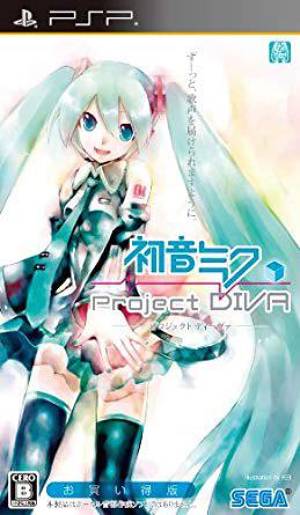Hatsune Miku: Project DIVA (video game): Difference between revisions
(add to museum) |
(add Project Diva category) |
||
| (3 intermediate revisions by the same user not shown) | |||
| Line 5: | Line 5: | ||
publisher = [[Sega]]| | publisher = [[Sega]]| | ||
systems = [[PlayStation 3|PS3]], [[PlayStation Portable|PSP]]| | systems = [[PlayStation 3|PS3]], [[PlayStation Portable|PSP]]| | ||
release = ''' | release = '''''Hatsune Miku: Project DIVA'''''<br />PSP JP: July 2, 2009<br /> PS3 (''[[Dreamy Theater]]'') JP: June 24, 2010<br />'''''Hatsune Miku: Project DIVA Arcade'''''<br />JP: June 23, 2010<br />JP (Version A): January 27, 2011<br />JP (Version B): July 5, 2012| | ||
added_to_museum = PSP: November 13, 2023| | added_to_museum = PSP: November 13, 2023| | ||
}} | }} | ||
'''''Hatsune Miku: Project DIVA''''' is a rhythm game developed by [[Sega]] and [[Dingo (company)|Dingo]] in conjunction with [[Hatsune Miku|Hatsune Miku's]] creator, [[Crypton Future Media]]. | '''''Hatsune Miku: Project DIVA''''' is a rhythm game developed by [[Sega]] and [[Dingo (company)|Dingo]] in conjunction with [[Hatsune Miku|Hatsune Miku's]] creator, [[Crypton Future Media]]. It is the first game in the [[Hatsune Miku: Project DIVA|''Hatsune Miku: Project DIVA]]'' series. | ||
With the ''[[Hatsune Miku: Project DIVA Dreamy Theater]]'' [[software application|application]], ''Hatsune Miku: Project DIVA'' can be played by using a [[PlayStation Portable]] as a controller on [[PlayStation 3]] with upgraded visuals. | With the ''[[Hatsune Miku: Project DIVA Dreamy Theater]]'' [[software application|application]], ''Hatsune Miku: Project DIVA'' can be played by using a [[PlayStation Portable]] as a controller on [[PlayStation 3]] with upgraded visuals. | ||
==Hatsune Miku: Project DIVA Arcade== | |||
'''''Hatsune Miku: Project DIVA Arcade''''' is an [[arcade]] adaptation of the game that runs on the Sega [[RingEdge]] hardware. It is the second game in the ''Hatsune Miku: Project DIVA'' series. | |||
The visuals were updated on the more capable hardware and the PlayStation button symbols were laid out horizontally on the arcade panel in large buttons. | |||
Multi-button notes were added to the gameplay, alongside hold notes, wherein the player holds down a button when "hold" is displayed on the screen to collect bonus points. | |||
[[Category: Hatsune Miku]] | |||
[[Category: Hatsune Miku: Project DIVA]] | |||
[[Category: Japan-exclusive video games]] | [[Category: Japan-exclusive video games]] | ||
[[Category: Physical items owned by WEC Museum]] | [[Category: Physical items owned by WEC Museum]] | ||
| Line 23: | Line 32: | ||
[[Category: Video games released in 2009]] | [[Category: Video games released in 2009]] | ||
[[Category: Video games released in 2010]] | [[Category: Video games released in 2010]] | ||
[[Category: Video games released on PlayStation 3]] | [[Category: Video games released on PlayStation 3 in Japan]] | ||
[[Category: Video games released on PlayStation Portable]] | [[Category: Video games released on PlayStation Portable in Japan]] | ||
Latest revision as of 20:08, 11 April 2024

| |
| Hatsune Miku: Project DIVA | |
| Developer | Sega, Dingo, Crypton Future Media |
|---|---|
| Publisher | Sega |
| Platforms | PS3, PSP |
| Released | Hatsune Miku: Project DIVA PSP JP: July 2, 2009 PS3 (Dreamy Theater) JP: June 24, 2010 Hatsune Miku: Project DIVA Arcade JP: June 23, 2010 JP (Version A): January 27, 2011 JP (Version B): July 5, 2012 |
| Added to Museum |
PSP: November 13, 2023 |
Hatsune Miku: Project DIVA is a rhythm game developed by Sega and Dingo in conjunction with Hatsune Miku's creator, Crypton Future Media. It is the first game in the Hatsune Miku: Project DIVA series.
With the Hatsune Miku: Project DIVA Dreamy Theater application, Hatsune Miku: Project DIVA can be played by using a PlayStation Portable as a controller on PlayStation 3 with upgraded visuals.
Hatsune Miku: Project DIVA Arcade
Hatsune Miku: Project DIVA Arcade is an arcade adaptation of the game that runs on the Sega RingEdge hardware. It is the second game in the Hatsune Miku: Project DIVA series.
The visuals were updated on the more capable hardware and the PlayStation button symbols were laid out horizontally on the arcade panel in large buttons.
Multi-button notes were added to the gameplay, alongside hold notes, wherein the player holds down a button when "hold" is displayed on the screen to collect bonus points.